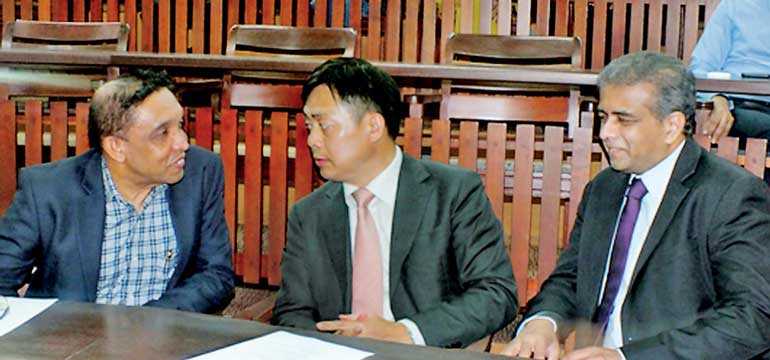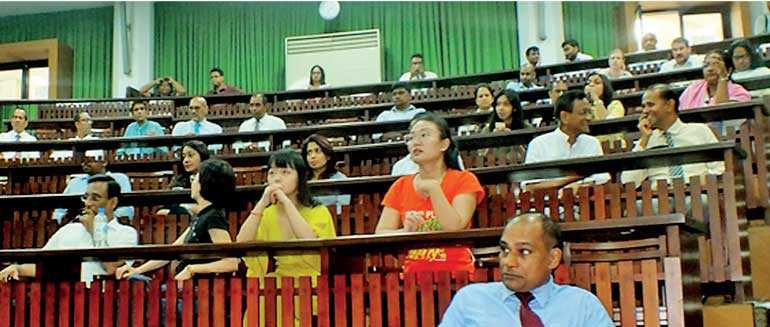Monday Feb 16, 2026
Monday Feb 16, 2026
Thursday, 6 February 2020 02:35 - - {{hitsCtrl.values.hits}}

CCC Chairman Dr. Hans Wijayasuriya

Participants of the event
Chinese approach to a better future of humankind is based on the Chinese historical and cultural values with two fundamental ideas: community sharing and mutual connectivity. Professor Wang Yiwei from China mentioned this at his keynote speech on ‘Belt and Road Initiative: Challenges and Way Forward’ delivered recently, at the Auditorium of the Ceylon Chamber of Commerce in Colombo (CCC).
The speech on Belt and Road Initiative (BRI) was organised jointly by the Ceylon Chamber of Commerce and the Pathfinder Foundation. Dr. Hans Wijayasuriya is the Chairman of CCC and internationally respected expert on digital economy.
Professor Wang Yiwei serves at the Renmin University of China and holds the Jean Monnet Chair Professorship. He is also the Director of the Institute of International Affairs as well as the Director of the Center for European Studies at the University. Professor Wang Yiwei has in-depth knowledge on the BRI project and published books and articles extensively on the subject.
High-quality global development
As revealed at the keynote speech, the BRI is aimed at high-quality development of nations from the Far East to Europe across Asia and Africa with open, green, clean and, people-centred elements. According to the World Bank Report on Belt and Road Economics, the BRI transport projects could help lift 7.6 million people from extreme poverty with current earning less than $ 1.90 a day, and 32 million people from moderate poverty with at present earning less than $ 3.20 a day. It will also reduce shipping time for both BRI countries and non-BRI countries, resulting in lower trade costs and trade expansion in the region. The largest estimated gains are for the trade routes connecting East and South Asia as well as along the corridors that are part of the BRI.

The BRI is about interconnectivity of transportation in the air, on land and sea, oil and gas pipelines, and telecommunications across 65 countries, connecting 4.4 billion on the planet of some seven billion people. It is a global transportation and other infrastructure network, comprising railways, highways, airlines, shipping lines, oil-gas, pipelines, power transmission lines and communication network. Ultimately, it is an economic corridor with integrated global development. The BRI can also be looked at as a project for reviving the Silk Road by international cooperation in order to build a Eurasian grand market. It brings about communities of two-thirds of the world population with shared interests, shared responsibilities and, shared future. The priority areas of the project are diverse as infrastructure, industrial investment, resource development, economic and trade cooperation, financial cooperation, maritime cooperation, cultural exchange and, ecological protection.
Sri Lankan perspective
The Sri Lankan perspective on the BRI was presented by Admiral Professor Jayanath Colombage, Additional Secretary to the President on Foreign Relations. More than half of the world’s container ships, one-third of bulk cargo traffic and two-thirds of global oil shipments use the Indian Ocean, and much of which transits shipping lanes near Sri Lanka on the way through the Strait of Malacca to the South China Sea. It shows the potential of Sri Lanka in the Indian Ocean, connecting to the BRI It is not only the locational advantage of the country, but also the specific deep-water harbours around the island which can accommodate any type of modern large ships give it a unique.
However, the Indian Ocean has now become the focal point for world powers – not only China, but also the countries like the USA, Japan and our neighbouring India. Thus, the foreign policy is utmost important for the country’s future as well as for the security of the region. Given this background, Sri Lanka will remain close to its neighbour India and, will adopt unbiased friendly relations with all other friendly countries.
Business perspective
The expectations of the business community of Sri Lanka from the BRI was presented by Shiran
Fernando, Chief Economist of the Ceylon Chamber of Commerce. While Hambantota port and the industrial zone as well as Colombo Port City are important projects that will have a major impact on the economy, according to the business community perspectives, Colombo port expansion, Oil refinery projects and, the industrial and export processing zones are the future projects of business importance.
Facilitating joint ventures with Chinese investors and private sector involvement in the project as well as cooperation in the area of technology are viewed as preferred business initiatives for the private sector. Among the specific areas of interests, partnerships with Chinese firms to link with value chains, transshipment and value addition, reduced logistics and transport costs, and increased market access are some of the areas highlighted by the business community. In this endeavour, they expect the government to invest in human resource development, to strengthen economic diplomacy, to build up international arbitration facility, to support setting up businesses in China and, to maintain policy consistency.
Open forum
The open forum at the end of the speech was moderated by Professor Sirimal Abeyratne of the University of Colombo. He acknowledges the fact that from a developing country point of view, BRI connectivity is a choice for developing countries around it. They can choose either to get connected to it and benefit from it or to stay away from it confining their focus on their own affairs without benefitting from it. He also appreciated the detailed comprehensive analysis of the keynote speaker, Professor Wang Yiwei, which was supplemented by the Sri Lankan government and business community perspectives. Professor Abeyratne invited Professor Wang Yiwei to comment on two controversial ideas that have been spread through international media as well as academic and political discussions. The first is the growing international concerns over the increased geopolitical tension in the Indian Ocean with the presence of world powers. The second is the accusations over the debt-trap in developing countries which has been interpreted in connection with the Chinese projects. Professor Wang Yiwei clarified the commercial and development objective of the Chinese presence in any area of the world, which has nothing to do with any military strategy on the part of China. Secondly, he also explained the development assistance extended by China is on the request of recipient countries that are well aware their external debt situation have the responsibility to put Chinese funding into productive use.
The way forward
Prof. Wang Yiwei was also later interviewed by Milinda Moragoda, Founder of the Pathfinder Foundation for prestigious talk show, Black & White. Subsequent discussions of the Pathfinder Foundation with Professor Wang Yiwei focused on the next level of development projects in Sri Lanka under the Belt and Road Initiative. The areas earmarked included cooperation in maritime research, Chinese assistance to Sri Lanka’s technological and technical education, the need for attraction of high-end Chinese tourists and, the production of films and TV programs for China Global Television Network (CGTN).